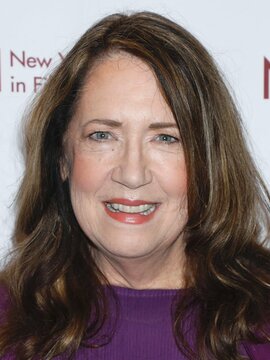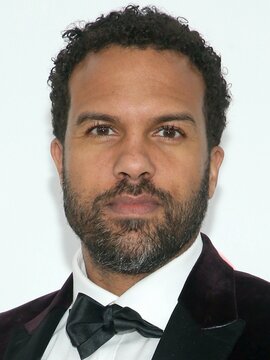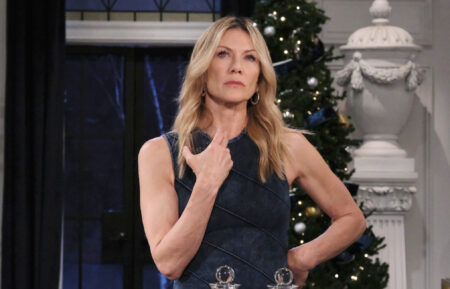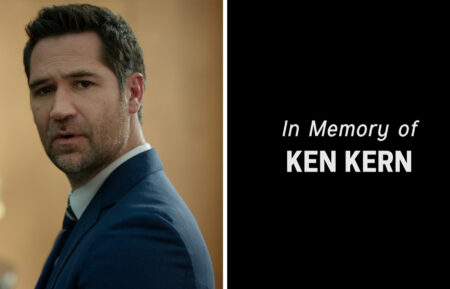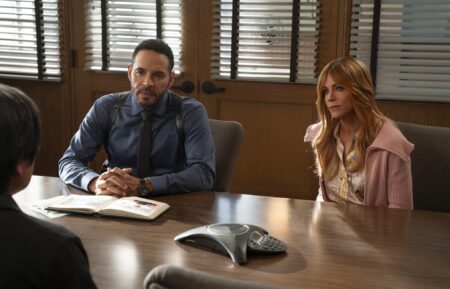How ‘The Handmaid’s Tale’ Finale Ending Was Incorporated Into the Very First Episode
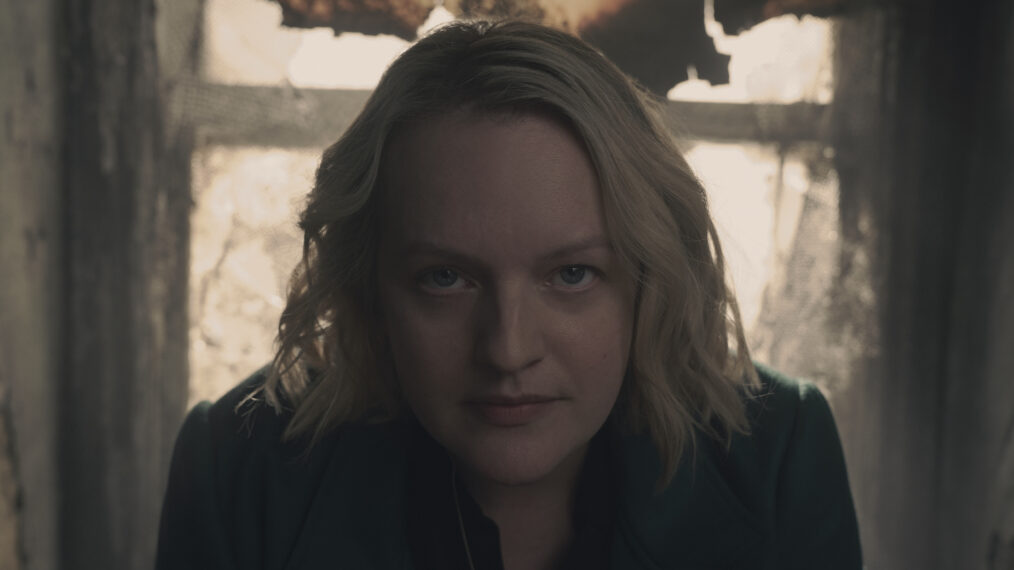
Spoiler Alert
[Warning: The following contains MAJOR spoilers for The Handmaid’s Tale series finale.]
The Handmaid’s Tale has ended after six seasons on Hulu. The fictional authoritarian regime of Gilead did not fall in the series finale, but it suffered its biggest military loss to date when Mayday and the U.S. military liberated Boston in the penultimate episode. The series finale, which came out at midnight E.T., 9 p.m. PT on May 27 on the streamer, picked up 19 days later when Massachusetts had been completely freed and restored as an American state. Also freed was the missing Janine (Madeline Brewer), who had been trapped in Gilead since Mayday’s attack in Episode 9. Aunt Lydia (Ann Dowd) and the now-widowed Naomi Lawrence (Ever Carradine) brought Janine to the Gilead-Boston border and brought Charlotte along with them. Janine and her daughter were at last reunited and safe in the U.S., making June (Elisabeth Moss) yearn for her long-lost daughter Hannah even more.
Sadly, June, Luke (O-T Fagbenle), and Hannah didn’t reunite in The Handmaid’s Tale series finale. She was seen in a new flashback scene and in a vision June had while visiting her old bedroom in the fire-damaged Waterford house in the show’s final moments (Hannah was played by Jordan Hutson instead of Jordana Brewster). Hannah will be a main character in the upcoming spinoff The Testaments and will be played by Chase Infiniti. With June and Luke still alive and deeply involved with Mayday by the end of the finale, it’s possible that they could make appearances in The Testaments, though no one from the spinoff’s team have confirmed any such cameos. It’s in The Testaments that The Handmaid’s Tale fans might finally see Gilead fall.
June and Luke have gone their separate ways. As for Serena (Yvonne Strahovski), revealing the time and location of the commanders’ flight to Washington, D.C. in the penultimate episode won her protection from the U.S. government and Mark Tuello (Sam Jaeger). Before Serena boarded the bus that would take her to a refugee center, she shared an emotional moment with June during which June did her the huge favor of saying she was forgiven. Whether June really forgives Serena for everything is up for debate, but it’s certain that June knew that Serena needed to hear those words in order to move forward.
The finale also brought back Alexis Bledel in a surprise cameo that provided a long-awaited update on Emily, who has been in a nearby town in Massachusetts since returning to Gilead to join the resistance in Season 5. Moira (Samira Wiley) and Rita (Amanda Brugel) are still involved with Mayday. And June’s mom, Holly (Cherry Jones), also came back to Boston with baby Nicole. Luke and Holly both urged June to write a book chronicling her time as a Handmaid, because the people in her story — including the recently deceased Nick (Max Minghella) and Commander Lawrence (Bradley Whitford) and all of the slain women June knew — were worth remembering.
The series ended with June visiting the Waterford house where the story all began, and then she started recording the first page of her book on a recording device. Elisabeth Moss closed out the series by reciting the first page of Margaret Atwood‘s The Handmaid’s Tale novel, recreating the same shot that opened the series in the “Offred” pilot. The decision to end the series by “writing” the Atwood book was made all the way back when former showrunner Bruce Miller was first developing the dystopian drama for Hulu. In fact, it was part of the vision he pitched to Moss before she agreed to star.
Miller is still an executive producer for the series after stepping down as showrunner for the final season. He did this to pivot to creating The Testaments spinoff, which is currently filming in Toronto. Miller also wrote the series finale, which was directed by Moss and fittingly titled “The Handmaid’s Tale.” Here, Bruce Miller explains The Handmaid’s Tale series finale to TV Insider.
To get started, you have Alexis Bledel back. Tell me how and why that happened.
Bruce Miller: Well, why it happened was because I was very eager to see the character and what had happened to the character. It was something I always wanted to do, and Alexis has a complicated schedule and a complicated life, and it didn’t work out that it was a good time to do it until the end. She moved heaven and earth to get up to us, and so there were a lot more practical concerns than character and emotional concerns.
I always wanted to know what happened to the character that she was playing, Emily, but also she was so central to June for so long. Even before the show started, they were walking partners. So there was something about bringing her back at the end that if June was going to re-experience that part of her life, it felt like it was impossible to do without that person because without knowing that both of them had made it out, you couldn’t believe in the impossible being possible. But the two of them together, both being alive and free really, I think was the one thing that June and the audience really did not expect to occur. I hope.
Tell me about the decision to have them revisit the Wall for this scene and have this location with such a dark history be a somewhat more hopeful place.
There’s more hope, but it’s not all hope. There’s still bodies hanging off in the corner. I wanted as much as possible for us to mimic their walking that they had done in Gilead, with enough common corners and visuals that you kind of feel like this is the same place. June, by going back to that part of town, is owning her trauma in a way that’s impossible without being able to trod free on the territory where you were enslaved. And that’s why the show ends with her being home [at the old, dilapidated Waterford house] for the first time. She’s been there for so long trapped, and now she’s home and it’s different. And so I think that them back on their own turf together, but the turf really matters. And in this case, the idea of the Wall and it being a place where they spent a lot of time contemplating what this world was like, they go back there to check in on, “What’s this world like?”
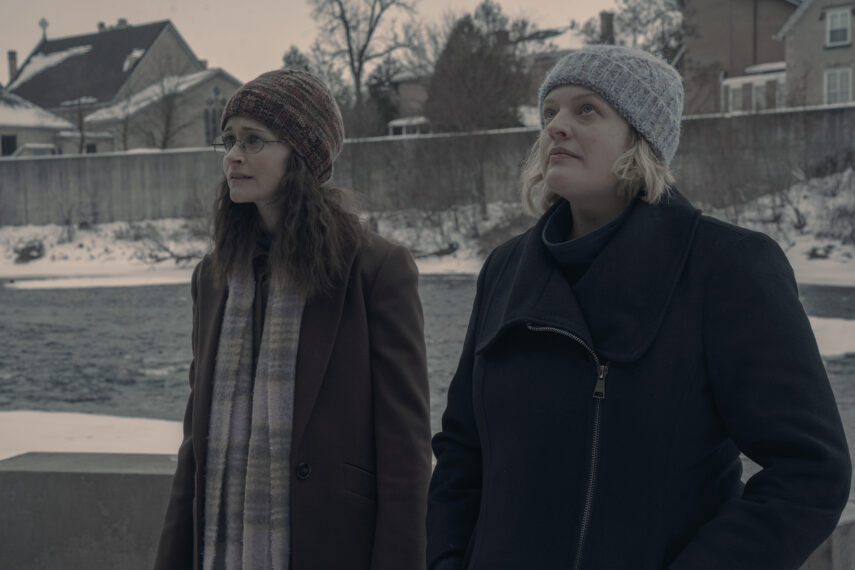
Disney / Steve Wilkie
June decides to write a book about her time in Gilead, as encouraged by Luke and Holly. The series ends with Elisabeth Moss reciting the first page of Margaret Atwood’s Handmaid’s Tale novel verbatim. Why was that the perfect ending?
I had read the book a lot before I got involved in it as a project, and I had also listened to the audiobook. And once you listen to the audiobook, you realize so in a more visceral way that, oh my God, this is whole thing’s an audiobook that was recorded once they start talking about where they found [Offred’s story] and all that. So I was very mindful as I was adapting it. This is [June’s] point of view. She didn’t know anything [outside of Gilead], and there’s no media. She didn’t know anything she didn’t know at the time. So that made the show, that defined the show, the fact that it was her point of view and the fact that her point of view is tied into the fact that it was these tapes.
So when I very much started the project, that was in my mind, and I think it was one of the first conversations I had with Elisabeth. I think it was before she even said yes to the role when she had just read the pilot. She’s been on an exceedingly large number of shows that have gone a very long time. She has wonderful taste in terms of the projects that she chooses. So you actually have the conversation about, “Well, what would happen if lightning struck and this actually all works out and it goes on? What would you think the ending for this kind of character story would be?” At that point, I was realizing how rich the book was as an adaption material. I was saying I would really follow Margaret Atwood’s lead. And the last thing you know that she did, the last thing Offred did in the book, was record this. That’s the very last thing. And I said, “I think we can still get there, that the very last thing about this is that she recorded this story.”
From the beginning, we were thinking about that. We weren’t navigating towards it. It was there. You can listen to the first episode of The Handmaid’s Tale, and you can hear that tape recorder start clicking. And that we put on 10 years ago when we made that. You can hear that click from the tape recorder that she turns on in the pilot.
The story in the book of the handmaid, even though it’s told at the end as historical notes, is that that woman who was Offred recorded this story at some point, she was not yet free, and Gilead did not fall immediately. So her recording that story is part of the character that we know. One of the very last things, but one of the most important things you find out about her is, she decided to record this horrible, difficult story of loss and pain, but you record it because there were so many people in it who are worth remembering, so many women especially who are worth remembering.
June and Luke have gone their separate ways by the end but have this intention to eventually to go find Hannah together. Luke’s plan is to free more states because that frees Hannah. And then June says she’s going to go find her immediately. Why not have them go together?
Because I think the important part of this is that they don’t have separate ways. They can’t go their separate ways. They’re both going towards the same thing, but I think they’re recognizing the fact that the part of them that’s changed since Gilead is bigger, more important, and more insistent in their personalities right now, and that’s what they’re going to follow. It isn’t so much what they’re going to do, it’s the fact that they didn’t check with each other when they decided. They both are fighting the fight, but they’re making decisions based on what they think is best for the situation where they can contribute the best to a success. And Luke has shown in this season, he really can contribute. He knows things that actually are incredibly helpful and his personality works to motivate people [he gets the electricity back up and running in Boston in the series finale].
My sense is that they may cross paths, they may work together, but they’re not checking with each other. I think they’ve separated in that way. This is the absolute essential thing in their lives, and it may be until the very end of their lives, but for now, bringing down Gilead and getting their daughter back is what they’re both doing. And as long as they have slightly different ideas about what they should be doing, they’re not going to be checking with each other, but they’re going to be supporting each other.
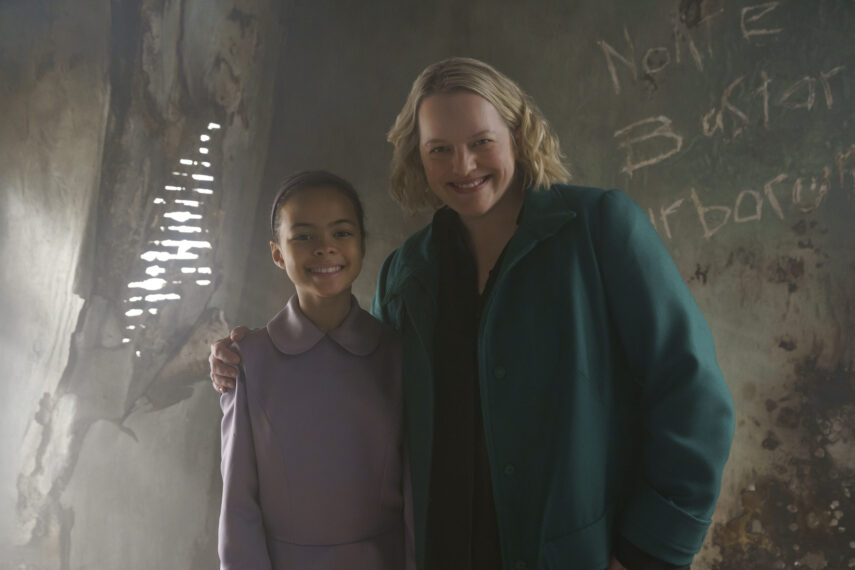
Disney / Steve Wilkie
We don’t see Hannah in the present timeline at all in this final season. Why not have June try to see her one last time? Is this because Hannah will be a main character in The Testaments?
There certainly is a sense, for me, that you’re more comfortable not seeing her because you know you have this big, juicy pie to come where you’re just following [Hannah’s] interesting story [in The Testaments]. So that certainly makes you feel more, but the fact that [June] saw [Hannah] at all ever again was a miracle. I think that we are selling the audience a bill of goods by saying these things are that easy. She has not seen her since she saw her in that box in jail. She has not seen her, and she did not see her very many times before that. She saw her once face to face and once when she was asleep. But she has not interacted with her at all. Those things, as June says in the finale, were completely impossible. And so I wanted to keep it to the impossible, not the desirable.
And it’s certainly a more realistic ending, as sad as it is. But we get a bit of hope in Janine’s reunion with Charlotte. Another realistic ending is Serena’s. She’s left with her baby, one plastic bag of supplies, and a cot to sleep on in a refugee shelter.
She got everything she wanted.
Well, that’s my question. Did she? Because there’s that moment in the finale when she says she doesn’t mean anything now. June basically says, “You have your son. Isn’t this why you did all of this?” So is the message with Serena saying she means “nothing” now that she really was making Gilead for the power of it, in addition to wanting a child? It really was never this altruistic thing, her goal for motherhood?
I don’t know about that because I’m sure there are lots of trappings of it, but I think it’s just be careful what you wish for. Sometimes you get exactly that. She thought, “The only thing I want out of all of this personally, I’m building this whole world so I can have a child. I get that, and I lose everything else in the process.” Is she a winner? She got exactly what she wanted, what she prayed for more than anything else in the world. Even for a very intelligent, very thoughtful, very emotionally aware woman as [Serena], she’s a simpleton when it comes to these things, the idea of how people are going to actually operate in the f***ing world. She’s a simpleton and a cruel simpleton.
Because of her separation from her parents, we didn’t get to know Hannah very well in The Handmaid’s Tale. What may surprise viewers about the person she’s grown into in The Testaments, and will Aunt Lydia be as present of a figure in Hannah and Daisy’s lives as she was in June’s?
To answer the second part, first I would say that Lydia is certainly as involved in the lives of Daisy and Hannah/Agnes in The Testaments as Lydia was in the life of June, but in a very, very different way. In the beginning of The Handmaid‘s Tale, Lydia is certainly a formidable and terrifying character. In The Testaments, her role is taking care of educating the plums — the most precious girls in Gilead, one of the most precious resources in the country. Lydia is not required to mete out punishment to the plums, but she is not in the role of breaking the spirit of worldly women who know modern life, as she did with the Handmaids.
You’re right that we didn’t get to know Hannah very well in The Handmaid‘s Tale, which was kind of central to the tragedy of June. She was not able to get to know her daughter well as she got older. So is this Hannah (who’s now called and thinks of herself as Agnes) who we expect her to be? I don’t know. I certainly see the June inside of her, and I hope over the course of the season and the course of the show, Agnes is going to try to change her world in ways that would make June very proud.
The Handmaid’s Tale, Seasons 1-6 Available Now, Hulu
The Testaments, Series Premiere, TBA, Hulu


!['The Handmaid's Tale' Brings [Spoiler] Back for Series Finale in Major Return](https://www.tvinsider.com/wp-content/uploads/2025/05/the-handmaids-tale-series-finale-alexis-bledel-elisabeth-moss-234x155.jpg)






